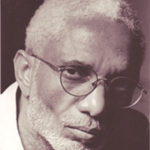
The topic of Lee’s presentation was THE PLACE OF ARTS IN PERSONAL AND SOCIAL DEVELOPMENT OF
ST. LUCIA—TOWARDS A MEANINGFUL
INTRODUCTION
It is a question that concerns me daily – why are the arts important? Why do artists bother to paint and write and act and sing and sculpt and dance? Why bother in a general milieu of lip service, benign neglect, discouraging unconcern? And what can art do – really – in our St. Lucian world of HIV Aids, drug violence, gun crimes, rapes and murders of young girls, popularised pornography, political mamaguyism etc etc? And add to that the “irresponsible democracy” afforded by the newer social media, with gossip, scandals, breaking unchecked news and all else at our eager, twittering, distracted finger tips.
Put alongside the urgent need for improved health services and other social necessities, the daily increase of all kinds of deviant behaviour, the mess that so much of family life is, the general decline in the quality (not the material quantity) of life, why fuss over books and paintings and choirs and old buildings that are an eyesore anyway?
As one involved in the arts for almost 50 years I am challenged daily by these questions. Who reads the poems and articles I write? For whom do I write, anyway? And beyond a temporary, immediate euphoria, who remembers the plays and dances staged by our performing artists? And why should our architects continue to fight over the restoration and preservation of a turn-of-the-century wooden building on Riverside or Chaussée Road, which only jumbies are using?
And yet, against all odds, we keep insisting on the importance of the arts to our society and its development. Our history, from enslavement of the majority of our peoples to Emancipation of enslaved Africans in 1838, through indentureship, colonialism, adult suffrage, independence and wherever we are today – needs the balancing perspectives of art to help us remember, understand, comprehend, envision who we are, what we have, where we are going, want to go, should not go.
As simply as we can, through articulation, and through our work, we must find ways to help our people to understand. And find ways to encourage the business and professional sectors to think more seriously about supporting arts and cultural development as they do sports and other community efforts.
The place of feeling
In advocating a thinking afresh of these issues, I cite an article by Susanne K. Langer (from which I quoted above) which I read many years ago. I became particularly interested in the place she gave to “human feeling.” Note her definition of ‘art’ as “the practice of creating perceptible forms expressive of human feeling.” She also says elsewhere in that article that “the primary function of art is to objectify feeling so we can contemplate and understand it.”
Our artistic creations – buildings or poems, dances or paintings – say something about our feelings about ourselves, our relationships, our world, our aspirations, our fears and apprehensions. They provide an objective portrayal or expression of the real (inner) state of our lives. Which we tend to avoid looking at too closely. “Feeling” here is understood not as sentimental, superficial, over-emotional froth. Rather, to speak of our ‘human feeling’ is to speak of our deepest graspings at understanding ourselves, our relationships and our lives in this world.
Culture is defined as ‘the way of life of a people.’ There is another definition of ‘culture’ that has to do with being ‘cultured’ ie educated, appreciative of the arts and the achievements of the human race. It is perhaps useful to remember that the word ‘culture’ comes from the Latin word for worship, originally meaning ‘reverential homage.’ The word developed from being used also to describe soil cultivation to speak of the cultivation of mind and manners. One definition proposes that culture is what we pass on to generations following us. Culture is then “accumulated understanding by which a given people live and maintain themselves in a given society.”
I recently read some other descriptions of culture that took in our industrialised, technologized, modern environments: “Culture includes all of those ways of looking at life, the habits of mind, that become typical and normative in a given context.”
But our cultures – our ways of life with all their objects, our arts, our histories, our customs and knowledge – are created by us, human beings. And thus, our culture – a living, complex organism – is a creation out of our deepest feelings. And those ‘feelings’ are a result of all that goes on in our intellect, emotions, will, conscience, spirit. We may also want to add to these the sexual, since the male and female, the masculine and feminine psyches, are significantly unique and powerful, to make a difference in comprehension of life’s situations.
For us in St. Lucia and the Caribbean our feelings and rationalisations are rooted deep in our shared and personal histories, deep in the soil of our complex historical experiences, including that decisive moment when we emerged from enslavement into an emancipation, that in many ways, challenged us to begin our lives again and to create a new path of history for ourselves.
Let us frame all these, in a general way, within the question of education and training of the human being. If the intellect and emotions and will are not developed through training and education, the human being is of little use to himself or anyone else. From the basics of survival to the management of the complexities of highly developed societies, every human child must be taught. And since the human is more than a physical entity of body and senses, a full education must extend to the inner man of the intellect. And a full education must extend to the training of the feeling man and woman. The conscience and the spirit must also be trained in moral and ethical values alongside the reading, writing, arithmetic, and cricket and football.
To underline and emphasise the point: the human being is not only a physical body, a sexual machine, a corpus of appetites. The human being, in the words of ancient philosophies, consists of at least four bodies, ie, the physical, emotional, intellectual and spiritual. Human development, if it is to be holistic, must pay attention to that whole being. I think we immediately recognize how malnourished our beings generally are, when we realize this truth of the fullness of human reality.
And here Susanne K. Langer speaks in terms that remind us of our own Sir Arthur Lewis. She says, “a wide neglect of artistic education is a neglect in the education of feeling. Most people are so imbued with the idea that feeling is a formless total organic excitement in humans as in animals, that the idea of educating feeling, developing its scope and quality, seems odd to them, if not absurd. It is really, I think, at the very heart of personal education.” And she says near the end of her article, “Art education is the education of feeling, and a society that neglects it gives itself up to formless emotion.”
Not only do the arts and arts education provide a necessary “education of feeling,” but they provide education in creative vision and creative use of the imagination. Artists, by their gifts, their ability to translate feeling into “perceptible forms,” help us to see. They help us to imagine. We are enabled to see light and dark, good and evil, possibilities both of construction and destruction. The training of our minds and consciences in moral and ethical standards, via religion or philosophy, should help us to make choices – helped by the vision and imagination of the artist – that will be a blessing and not a curse to our fellow human beings.
And then, the arts and arts education, provide a stabilization. Culture is always developing. Times are changing. The older we get, the more we are interested in certainties, in order around us (if not in the wider world.) The best art (like good religious faith) holds down for us, in manageable slices, our world and our feelings about the world in which we are rooted. In this post modern world with all its agnosticisms, it offers a world and life view, a possible meta-narrative, to which we are invited, if we will, to subscribe. We cannot be in flux all the time. Not after youthful irresponsibility has given way to domestic imperatives. Where art objectifies and captures our comprehension and perceptions of ourselves and our world, there we are helped to find stability and order.




![Simón Bolívar - Liberator of the Americas [Photo credit: Venezuelan Embassy]](https://thevoiceslu.com/wp-content/uploads/2025/12/Simon-Bolivar-feat-2-380x250.jpg)





